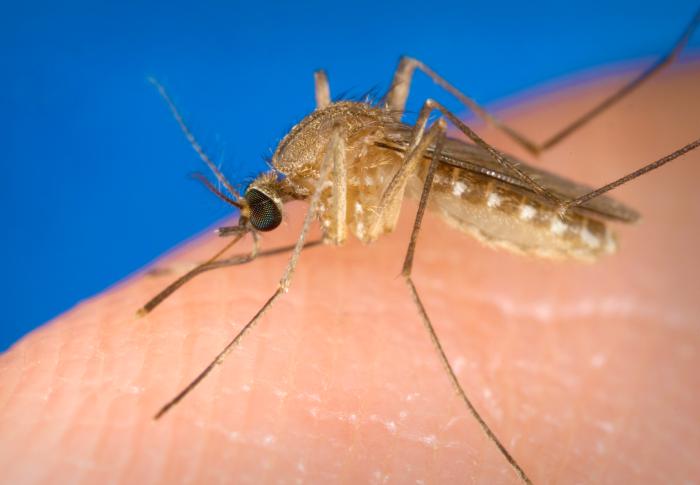A 6-year-old Sussex County girl was briefly hospitalized with West Nile Virus (WNV) and is now recovering at home. The case is the first human WNV case reported since 2013. The mosquito-borne illness can become serious and the Division of Public Health reminds people to take precautions to avoid mosquito bites.

Image/CDC
WNV is transmitted by mosquitoes, generally from spring to fall. Although nearly 80 percent of people infected with WNV will not become ill and only a little less than 20 percent of those infected will develop West Nile fever, with mild symptoms (fever, headache, body aches, a skin rash on the chest or back and swollen lymph glands), one in 150 people infected develop severe infection (West Nile encephalitis or meningitis).
Symptoms of severe WNV infection include headache, high fever, stiff neck, and/or tremors and muscle weakness. The elderly and those with weakened immune systems are most at risk. Anyone who experiences any of these severe symptoms should seek medical help immediately. Symptoms may progress to stupor, disorientation, coma, convulsions, paralysis, and possibly death.
“This new human case is a reminder that West Nile virus is still active in Delaware,” said Dr. Karyl Rattay, Division of Public Health Director. “It’s tempting with the distractions of summer fun to forget to protect you and your loved ones from insect bites. These bites can cause much more serious health problems than just itching and discomfort.”
Mosquitoes can also carry Eastern equine encephalitis (EEE), and several other diseases that cause brain inflammation (encephalitis) and can be fatal to humans and animals. To avoid mosquito bites and reduce the risk of infection, individuals should:
• When outside, wear shoes, long-sleeved shirts, and pants. Mosquito netting can protect one’s face and neck, and infants in carriages, strollers, and playpens. Mosquitoes are most active at dusk and during the early-morning hours.
• Mosquito repellents containing DEET can be applied to the skin, but will last only a few hours before reapplication is necessary. Use insect repellent containing less than 50 percent DEET for adults. The current American Academy of Pediatrics and Centers for Disease Control and Prevention recommend using 10 to 30 percent DEET for children above 2 months old. The higher the strength, the longer the DEET provides protection which varies between two to five hours.
• Read labels carefully and always follow the instructions. DEET should not be used on children younger than 2 months.
• Prevent mosquitoes from entering the house by using screens and keeping windows and doorways tightly sealed. Mosquitoes prefer shallow water and tall vegetation. Eliminate standing water in your yard by changing birdbath water weekly, regularly draining pet dishes and plant pot saucers, and checking gutters, pool covers, and tarps for standing water. Store buckets, wheelbarrows, and wading pools upside down. Keep grass mowed.
In Delaware, there were no reported human WNV cases in 2014, three cases in 2013, and nine cases in 2012 with one fatality.
Related: VRSA reported in Delaware patient, 14th case ever reported in US


One thought on “Delaware report first human West Nile virus case since 2013”